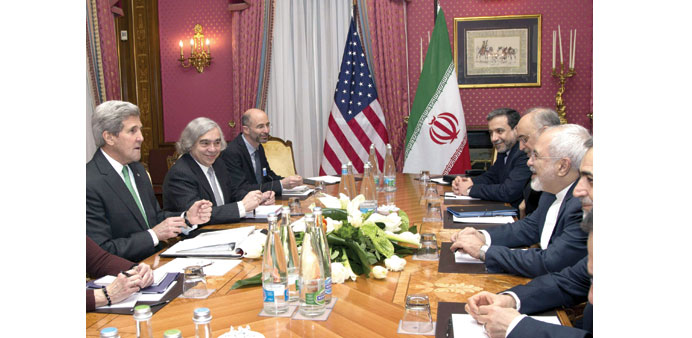US Secretary of State John Kerry meeting with Iran’s Foreign Minister Javad Zarif over Iran’s nuclear programme in Lausanne yesterday. Also at the negotiating table are US secretary of energy Ernest Moniz and the head of the Atomic Energy Organisation of Iran Ali Akbar Salehi.
AFP
Lausanne
The chances of clinching a nuclear deal with Iran are 50/50 “at best”, the White House said yesterday as negotiators in Switzerland raced against the clock to close the gaps.
“In the mind of the president the odds have not moved,” and “some of the most difficult issues ... have yet to be resolved,” a White House spokesman said in Washington.
This followed comments from Iran’s nuclear chief at the talks in Lausanne involving US Secretary of State John Kerry that “90% of the technical issues” have been agreed.
“In most of the issues we have come to mutual agreements - we have differences only in one major issue which we will try to solve (soon),” Ali Akbar Salehi said.
Iran and six world powers - the US, Russia, Britain, France, Britain and Germany - aim to agree the framework of a nuclear deal by March 31 and then have a full deal by July 1.
Such an agreement, they hope, will convince the world that Iran will not develop nuclear weapons under the guise of its civilian programme, a goal Tehran strenuously denies having.
The accord would involve Iran agreeing to scale down its nuclear activities to within strict limits in return for relief from sanctions suffocating its economy.
If they manage it and the accord holds, both sides hope it will end a 12-year standoff and help normalise Iran’s international relations at a particularly volatile time in the Middle East.
Two deadlines to get a deal in July and November were missed but intense political pressure in Washington means President Barack Obama’s administration can hardly afford to extend yet again, experts say.
But it is a highly complex undertaking, with negotiators having to work out the future scope of Iran’s programme and the timing of sanctions relief, amongst other thorny topics.
“Iran wants as much sanctions relieved as possible up front in the deal. The US and its allies in the P5+1 would like to have sanctions relief come in phases,” Reza Marashi from the National Iranian American Council (NIAC) told AFP.
As a result US negotiators in the marathon talks were more downbeat than Salehi, with one senior administration official – involved in the technical side of the negotiations – saying yesterday there was still “a ways to go”.

